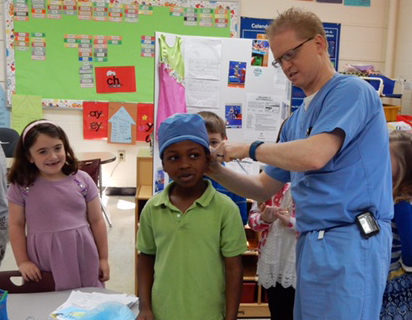My experience teaching surgery to first-graders
Written by Dr. Sean Skinner, pediatric surgeon at Kentucky Children’s Hospital.
Not many first-grade science curriculums include hands-on surgical training, but that’s exactly the lesson I taught to my daughter’s class earlier this year.
As a pediatric surgeon, I had the opportunity to talk with my daughter and her first-grade peers at Sayre School in Lexington as part of a larger lesson about machines in workplaces. When she mentioned to her teacher, Mrs. Angela Hardin, that I “worked with machines and robots at the hospital,” Mrs. Hardin offered me the opportunity to share my experiences with the class.
What followed was an exploration of surgery seen through the eyes of first-graders. I showed them the tools I use on a daily basis and fit them for surgical masks. I then explained to them that laparoscopy is a kind of surgery where we make very small cuts and perform the procedure with the assistance of a small camera that goes inside of a person’s body.
With the basics out of the way, the real fun started. The kids got to try their hands at the same laparoscopic training machines we use at the hospital. Using surgical tools attached to a camera and monitor, they performed a short drill of picking up beads from one cup and moving them to another. It didn’t take long for them to realize just how hard it is to use the instruments while watching a monitor at the same time.
I had a blast seeing how excited the kids were to use the simulators and answering all of their questions about surgery and being a doctor.
Pediatric surgery is no doubt a complicated subject for first-graders, but I think it’s important for children to learn about as many different careers as possible. Through activities like the one at my daughter’s school, kids are able to see what their parents and what other parents do.
I think it would be great to do this type of presentation and hands-on learning activity with more classrooms in Lexington and bring it to different age groups. The more topics children are exposed to at a young age, the better.
Of course, I think learning about science is important for all students and doing so at an early age could spur their interest in science and medicine going forward.
And who knows, maybe an activity like this could spark the next great scientist of the future.
